[ad_1]
Environment friendly, trendy, and breathtaking in its scope, UNC TEACCH celebrates its fiftieth anniversary as a stellar demonstration of dedication, excellence, and collaboration to assist people with autism and their households throughout the state and around the globe.

“TEACCH is without doubt one of the few locations within the state you possibly can go in case you really need direct expertise working with autistic people throughout the spectrum and lifespan. It combines medical follow, on the bottom coaching, and expertise with analysis.” –Brian Boyd, PhD, William C. Friday Distinguished Professor in Training on the College of North Carolina.
At its fiftieth anniversary celebration and convention this fall, you possibly can see and really feel the optimistic impression UNC TEACCH has had on the group. A whole lot of individuals from around the globe gathered in individual and nearly, every of them devoted to the care of individuals with autism, the coaching of autism educators and caregivers, and the analysis that helps hundreds of thousands.
Its affect now spreads far and large, however initially, this system was obtainable solely in North Carolina, because of funding by the state of North Carolina in 1972 to create a regional heart strategy in offering medical providers, coaching, and analysis for people with Autism Spectrum Dysfunction (ASD) throughout North Carolina. The TEACCH Autism Program was developed within the mid-Nineteen Sixties by the late Dr. Eric Schopler, a professor of psychiatry and psychology on the College of North Carolina at Chapel Hill. Schopler was one of many first to determine that autism was a treatable neurological situation. Beforehand, mother and father have been blamed for inflicting what was then held to be a psychological drawback. In 1971, Schopler enlisted mother and father as co-therapists in personalized remedies to assist kids with autism acquire essential life abilities.
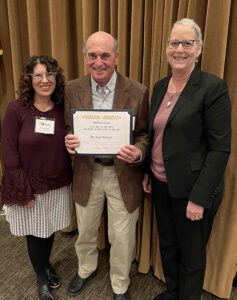
“At the moment that strategy is sort of widespread within the subject, however again in mid-60s and early 70s, no person was doing such issues,” mentioned Lee Marcus, PhD, who throughout his 48 12 months profession at UNC served because the director of the Chapel Hill TEACCH Heart. He additionally not too long ago received the Eric Schopler Lifetime Achievement award on the UNC TEACCH Autism Program Annual Convention this fall.
The imaginative and prescient of TEACCH is to have a world the place all people with ASD and their households have entry to wonderful evidence-based providers of their residence communities. Quick ahead to 50 years after it was based, and this system is doing simply that – increasing to seven outpatient clinics throughout North Carolina and serving all 100 counties within the state in 2021.
“The whole lot we do is about bringing evidence-based practices to households in their very own communities, whether or not that be analysis, coaching professionals, or direct medical providers,” mentioned Laura Klinger, PhD, affiliate professor within the Division of Psychiatry on the UNC College of Medication and govt director of UNC TEACCH.
Offering Companies Throughout the Lifespan
Again within the early 70s and 80s, a baby might be recognized with autism as early as age 5, although some people have been recognized a lot later. Now early invention can occur for 18-month-olds and 2-year-olds. And TEACCH doesn’t cease at childhood; this system supplies providers from infancy to older adults of their 70s and 80s, an enormous step within the subject of autism.
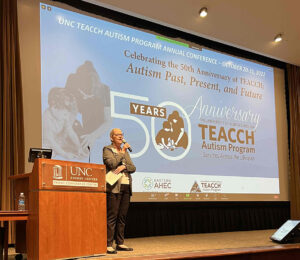
“When autism was first conceptualized it was referred to as childish autism and there wasn’t a variety of considered kids as they grew up,” mentioned Dr. Klinger. “Within the 80s, TEACCH was the chief within the subject to convey up the dialog about autistic adults. We’re seeing a variety of people who have been recognized within the late 70s and 80s now of their 50s and 60s. We’re considering forward of what packages are wanted and what intervention helps are wanted for older adults who’ve autism.”
TEACCH’s medical providers are designed to advertise optimistic habits, communication, social abilities, growth, and coping abilities. Their packages vary from: TEACCH for Toddlers, College-age Social Expertise/Emotion Regulation, Transition to Maturity, and Grownup Psychological Well being. These providers are all tailor-made to satisfy the distinctive wants of every particular person with ASD and their household – regardless of their age. TEACCH supplies training and coaching resembling workshops for folks, academics, and different professionals specializing in traits of autism and intervention methods. An employment program for autistic people can be provided within the Triad and the Triangle, in addition to a residential program positioned in Pittsboro.
As a part of the UNC Autism Research Center, researchers at TEACCH are working to determine which varieties of interventions work finest for every particular person throughout the lifespan. Initiatives embrace interventions for toddlers, kids, adolescents and adults in addition to grownup outcomes analysis. This system companions with colleagues throughout UNC-Chapel Hill and the nation to enhance data about Autism Spectrum Dysfunction and, finally, the standard of life for people with ASD and their households. Brian Boyd, PhD, William C. Friday Distinguished Professor in Training on the College of North Carolina who started his profession at TEACCH after graduating from school is now a number one researcher, targeted on the way to higher serve individuals with autism who’re a part of marginalized communities.
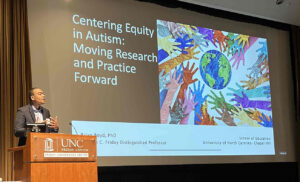
“People who’ve been recognized with autism will not be divorced from residing in poverty or experiencing racism or coping with different issues that marginalized and weak teams take care of on this society,” mentioned Dr. Boyd. “When you find yourself on the intersection of getting a incapacity but additionally being a member of one other marginalized group then that may actually have an effect on your outcomes. Autism has no racial or ethnic boundaries and neither ought to our analysis research.”
The intersection of psychological well being and autism can be a prime analysis precedence. Brenna Maddox, PhD, assistant professor within the UNC Division of Psychiatry and an implementation scientist for the UNC TEACCH Autism Program, works on the way to enhance the psychological well being and high quality of life for people with autism, with a particular deal with suicide prevention.
“We all know that autistic persons are at higher threat for suicide, and we additionally know that interventions designed for non-autistic individuals is probably not a superb match for autistic people,” mentioned Dr. Maddox. “Which means we want tailor-made interventions that deal with the distinctive wants of autistic people in danger for suicide,” she mentioned.
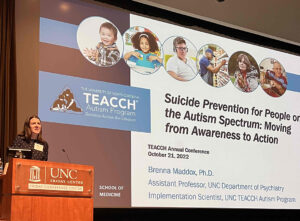
From understanding how underrepresented teams are affected to addressing psychological well being and suicide prevention, TEACCH has grow to be a mirrored image within the modifications we’re seeing in the way to tailor to those that have been recognized with autism. Analysis continues all through this system to assist people to stay lengthy significant lives. For these transitioning to maturity, there’s the T-STEP program, a community-college transition to maturity program that helps people grow to be as impartial as potential by helping them in making ready for faculty and employment.
“Present analysis reveals college students enrolled within the T-STEP program are making enhancements of their work-readiness abilities,” Dr. Klinger mentioned. “They’re extra ready for work. They’re reporting much less nervousness they usually’re reporting extra alternatives in making selections for themselves.”
In older adults with autism, analysis has proven how cognitive-able people reported signs of cognitive decline over time. TEACCH is now making efforts to be taught extra about what it means to age with autism.
“In a single examine group, 30 p.c reported signs of cognitive decline with the common being 54-years-old,” Dr. Klinger mentioned. “It is a drawback as a result of 30 p.c of the world doesn’t expertise signs of dementia of their mid-50’s, however we’re seeing that in our autism inhabitants.”
Higher entry to care and satisfactory help are each important to bettering the outlook for seniors with autism. The effectiveness of analysis and responding to those points can actually assist push the sphere within the route it must go, in line with Klinger, permitting for a greater understanding of getting old with autism.
The Way forward for TEACCH
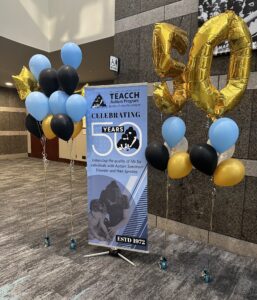 As a world chief in autism training, TEACCH supplies quite a lot of coaching packages domestically, nationally, and internationally. These evidence-based practices can be found for professionals to learn to help autistic college students within the colleges in addition to sufferers in clinics. From educators to psychologists, this system skilled 5,600 professionals final 12 months from 46 nations, together with professionals from 42 states within the U.S.
As a world chief in autism training, TEACCH supplies quite a lot of coaching packages domestically, nationally, and internationally. These evidence-based practices can be found for professionals to learn to help autistic college students within the colleges in addition to sufferers in clinics. From educators to psychologists, this system skilled 5,600 professionals final 12 months from 46 nations, together with professionals from 42 states within the U.S.
“Quite a lot of what we’re doing in our skilled growth packages is coaching educators everywhere in the world about the way to help college students of their school rooms,” mentioned Dr. Klinger. “It’s not a curriculum for math, studying or science, it’s extra about offering help for the training variations college students with autism have.”
In accordance with the Facilities for Illness Management, about 1 in 44 children are recognized with ASD, exhibiting there’s a rising want of coaching group professionals within the subject. TEACCH is rising quickly and altering with the occasions to raised serve people with ASD.
“I really feel actually privileged to have the chance to guide a company that has made such an impression for 50 years,” mentioned Dr. Klinger.
“I believe one of many fascinating issues about TEACCH is what number of well-known researchers within the subject labored at TEACCH sooner or later of their profession,” mentioned Dr. Brian Boyd. “It has actually been a breeding floor for coaching a number of the autism researchers who’ve made an impression.”
Analysis in getting old, efficient digital trainings and workshops, amplifying the voices of autistic people, and early intervention for kids recognized with autism are the highest objectives for TEACCH. It’s a program that not solely delivers responsive practices, however appreciates the distinctive strengths of each particular person whereas emphasizing the significance of steady lifelong studying.
“It began in 1972 when autism was unknown to now being some of the acknowledged situations {that a} household can face,” mentioned Dr. Lee Marcus. “To know that we’re part of the modifications over time to helping households, college students, and professionals has been very rewarding.”
Media contact: Brittany Phillips
[ad_2]
Source link

